Comprehensive Report: Al-Kateb v Godwin Case, Judgement, and Detention
VerifiedAdded on 2020/12/29
|8
|2223
|179
Report
AI Summary
This report provides a detailed analysis of the Al-Kateb v Godwin case, focusing on the High Court's judgement and the implications of indefinite detention under the Migration Act. It explores the differing opinions of the judges, particularly concerning the constitutionality of indefinite detention and the interpretation of the Migration Act. The report examines the arguments presented by both the majority and dissenting judges, including their views on the rights of non-citizens and the role of the courts in interpreting legislation. It also discusses the historical context of the case, drawing parallels with previous instances of detention and constitutional interpretation. Furthermore, the report assesses the consequences of the Al-Kateb v Godwin decision, including its impact on immigration law, the rights of detainees, and the broader implications for Australian society. The report concludes by summarizing the key findings and emphasizing the significance of the case in shaping the legal landscape of Australia.
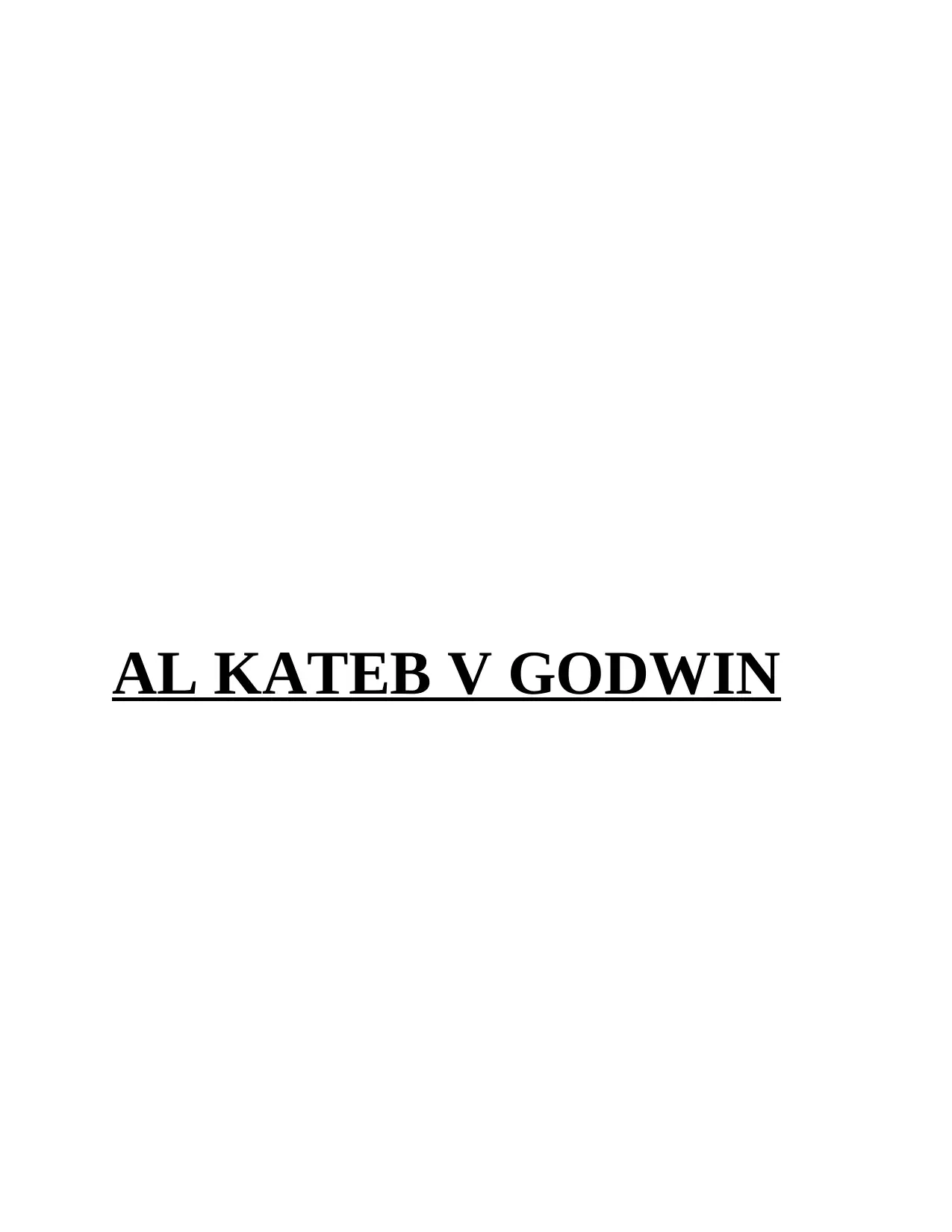
AL KATEB V GODWIN
Paraphrase This Document
Need a fresh take? Get an instant paraphrase of this document with our AI Paraphraser
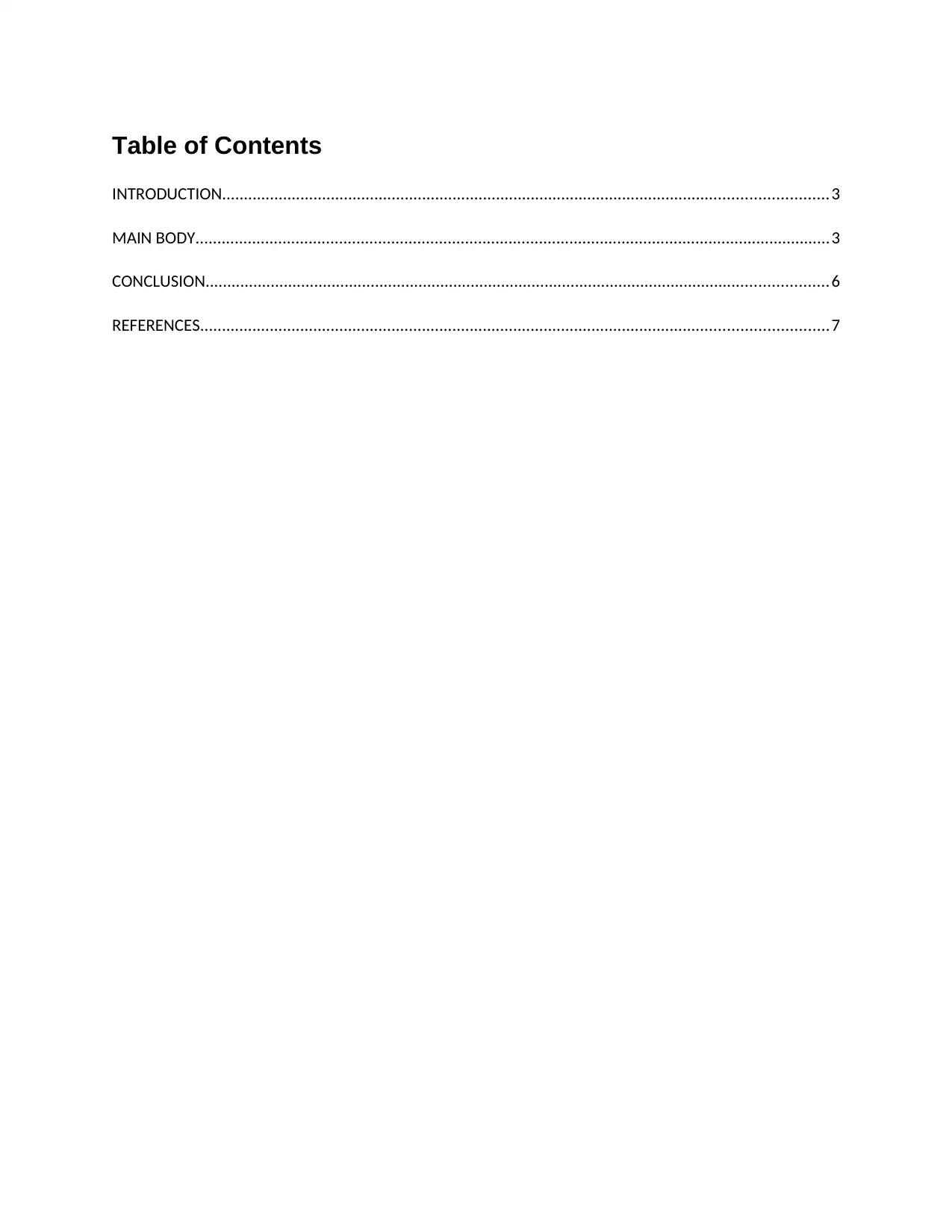
Table of Contents
INTRODUCTION...........................................................................................................................................3
MAIN BODY..................................................................................................................................................3
CONCLUSION...............................................................................................................................................6
REFERENCES................................................................................................................................................7
INTRODUCTION...........................................................................................................................................3
MAIN BODY..................................................................................................................................................3
CONCLUSION...............................................................................................................................................6
REFERENCES................................................................................................................................................7
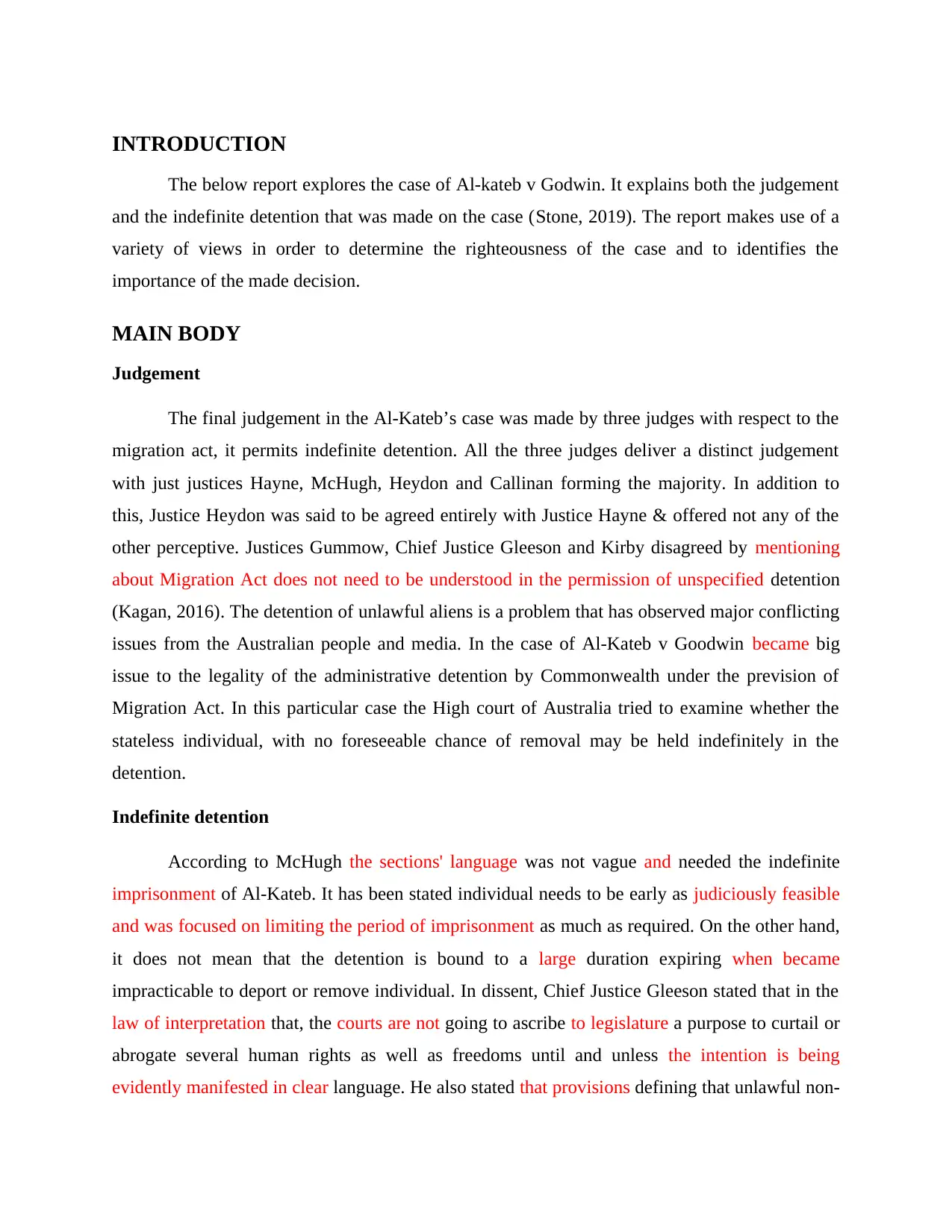
INTRODUCTION
The below report explores the case of Al-kateb v Godwin. It explains both the judgement
and the indefinite detention that was made on the case (Stone, 2019). The report makes use of a
variety of views in order to determine the righteousness of the case and to identifies the
importance of the made decision.
MAIN BODY
Judgement
The final judgement in the Al-Kateb’s case was made by three judges with respect to the
migration act, it permits indefinite detention. All the three judges deliver a distinct judgement
with just justices Hayne, McHugh, Heydon and Callinan forming the majority. In addition to
this, Justice Heydon was said to be agreed entirely with Justice Hayne & offered not any of the
other perceptive. Justices Gummow, Chief Justice Gleeson and Kirby disagreed by mentioning
about Migration Act does not need to be understood in the permission of unspecified detention
(Kagan, 2016). The detention of unlawful aliens is a problem that has observed major conflicting
issues from the Australian people and media. In the case of Al-Kateb v Goodwin became big
issue to the legality of the administrative detention by Commonwealth under the prevision of
Migration Act. In this particular case the High court of Australia tried to examine whether the
stateless individual, with no foreseeable chance of removal may be held indefinitely in the
detention.
Indefinite detention
According to McHugh the sections' language was not vague and needed the indefinite
imprisonment of Al-Kateb. It has been stated individual needs to be early as judiciously feasible
and was focused on limiting the period of imprisonment as much as required. On the other hand,
it does not mean that the detention is bound to a large duration expiring when became
impracticable to deport or remove individual. In dissent, Chief Justice Gleeson stated that in the
law of interpretation that, the courts are not going to ascribe to legislature a purpose to curtail or
abrogate several human rights as well as freedoms until and unless the intention is being
evidently manifested in clear language. He also stated that provisions defining that unlawful non-
The below report explores the case of Al-kateb v Godwin. It explains both the judgement
and the indefinite detention that was made on the case (Stone, 2019). The report makes use of a
variety of views in order to determine the righteousness of the case and to identifies the
importance of the made decision.
MAIN BODY
Judgement
The final judgement in the Al-Kateb’s case was made by three judges with respect to the
migration act, it permits indefinite detention. All the three judges deliver a distinct judgement
with just justices Hayne, McHugh, Heydon and Callinan forming the majority. In addition to
this, Justice Heydon was said to be agreed entirely with Justice Hayne & offered not any of the
other perceptive. Justices Gummow, Chief Justice Gleeson and Kirby disagreed by mentioning
about Migration Act does not need to be understood in the permission of unspecified detention
(Kagan, 2016). The detention of unlawful aliens is a problem that has observed major conflicting
issues from the Australian people and media. In the case of Al-Kateb v Goodwin became big
issue to the legality of the administrative detention by Commonwealth under the prevision of
Migration Act. In this particular case the High court of Australia tried to examine whether the
stateless individual, with no foreseeable chance of removal may be held indefinitely in the
detention.
Indefinite detention
According to McHugh the sections' language was not vague and needed the indefinite
imprisonment of Al-Kateb. It has been stated individual needs to be early as judiciously feasible
and was focused on limiting the period of imprisonment as much as required. On the other hand,
it does not mean that the detention is bound to a large duration expiring when became
impracticable to deport or remove individual. In dissent, Chief Justice Gleeson stated that in the
law of interpretation that, the courts are not going to ascribe to legislature a purpose to curtail or
abrogate several human rights as well as freedoms until and unless the intention is being
evidently manifested in clear language. He also stated that provisions defining that unlawful non-
⊘ This is a preview!⊘
Do you want full access?
Subscribe today to unlock all pages.

Trusted by 1+ million students worldwide
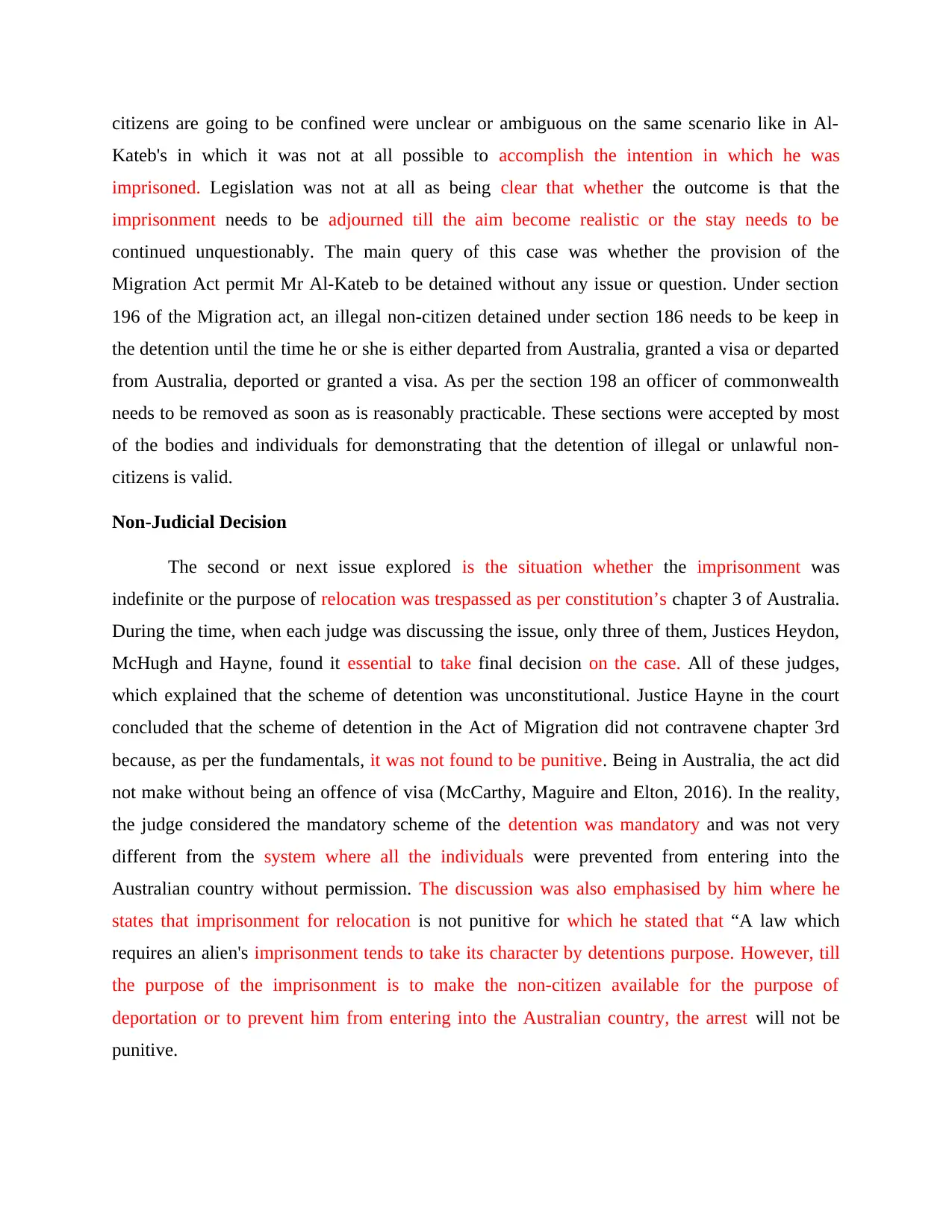
citizens are going to be confined were unclear or ambiguous on the same scenario like in Al-
Kateb's in which it was not at all possible to accomplish the intention in which he was
imprisoned. Legislation was not at all as being clear that whether the outcome is that the
imprisonment needs to be adjourned till the aim become realistic or the stay needs to be
continued unquestionably. The main query of this case was whether the provision of the
Migration Act permit Mr Al-Kateb to be detained without any issue or question. Under section
196 of the Migration act, an illegal non-citizen detained under section 186 needs to be keep in
the detention until the time he or she is either departed from Australia, granted a visa or departed
from Australia, deported or granted a visa. As per the section 198 an officer of commonwealth
needs to be removed as soon as is reasonably practicable. These sections were accepted by most
of the bodies and individuals for demonstrating that the detention of illegal or unlawful non-
citizens is valid.
Non-Judicial Decision
The second or next issue explored is the situation whether the imprisonment was
indefinite or the purpose of relocation was trespassed as per constitution’s chapter 3 of Australia.
During the time, when each judge was discussing the issue, only three of them, Justices Heydon,
McHugh and Hayne, found it essential to take final decision on the case. All of these judges,
which explained that the scheme of detention was unconstitutional. Justice Hayne in the court
concluded that the scheme of detention in the Act of Migration did not contravene chapter 3rd
because, as per the fundamentals, it was not found to be punitive. Being in Australia, the act did
not make without being an offence of visa (McCarthy, Maguire and Elton, 2016). In the reality,
the judge considered the mandatory scheme of the detention was mandatory and was not very
different from the system where all the individuals were prevented from entering into the
Australian country without permission. The discussion was also emphasised by him where he
states that imprisonment for relocation is not punitive for which he stated that “A law which
requires an alien's imprisonment tends to take its character by detentions purpose. However, till
the purpose of the imprisonment is to make the non-citizen available for the purpose of
deportation or to prevent him from entering into the Australian country, the arrest will not be
punitive.
Kateb's in which it was not at all possible to accomplish the intention in which he was
imprisoned. Legislation was not at all as being clear that whether the outcome is that the
imprisonment needs to be adjourned till the aim become realistic or the stay needs to be
continued unquestionably. The main query of this case was whether the provision of the
Migration Act permit Mr Al-Kateb to be detained without any issue or question. Under section
196 of the Migration act, an illegal non-citizen detained under section 186 needs to be keep in
the detention until the time he or she is either departed from Australia, granted a visa or departed
from Australia, deported or granted a visa. As per the section 198 an officer of commonwealth
needs to be removed as soon as is reasonably practicable. These sections were accepted by most
of the bodies and individuals for demonstrating that the detention of illegal or unlawful non-
citizens is valid.
Non-Judicial Decision
The second or next issue explored is the situation whether the imprisonment was
indefinite or the purpose of relocation was trespassed as per constitution’s chapter 3 of Australia.
During the time, when each judge was discussing the issue, only three of them, Justices Heydon,
McHugh and Hayne, found it essential to take final decision on the case. All of these judges,
which explained that the scheme of detention was unconstitutional. Justice Hayne in the court
concluded that the scheme of detention in the Act of Migration did not contravene chapter 3rd
because, as per the fundamentals, it was not found to be punitive. Being in Australia, the act did
not make without being an offence of visa (McCarthy, Maguire and Elton, 2016). In the reality,
the judge considered the mandatory scheme of the detention was mandatory and was not very
different from the system where all the individuals were prevented from entering into the
Australian country without permission. The discussion was also emphasised by him where he
states that imprisonment for relocation is not punitive for which he stated that “A law which
requires an alien's imprisonment tends to take its character by detentions purpose. However, till
the purpose of the imprisonment is to make the non-citizen available for the purpose of
deportation or to prevent him from entering into the Australian country, the arrest will not be
punitive.
Paraphrase This Document
Need a fresh take? Get an instant paraphrase of this document with our AI Paraphraser
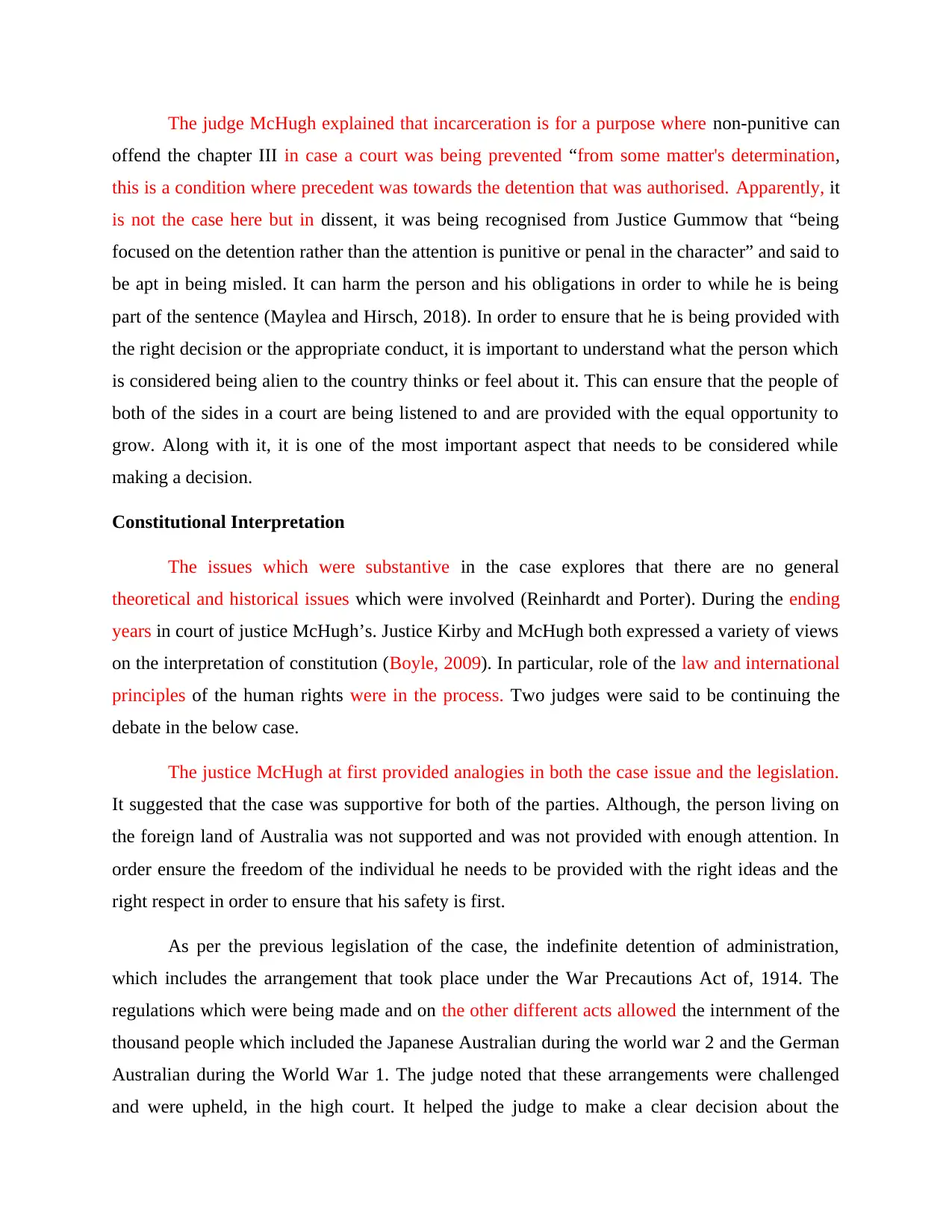
The judge McHugh explained that incarceration is for a purpose where non-punitive can
offend the chapter III in case a court was being prevented “from some matter's determination,
this is a condition where precedent was towards the detention that was authorised. Apparently, it
is not the case here but in dissent, it was being recognised from Justice Gummow that “being
focused on the detention rather than the attention is punitive or penal in the character” and said to
be apt in being misled. It can harm the person and his obligations in order to while he is being
part of the sentence (Maylea and Hirsch, 2018). In order to ensure that he is being provided with
the right decision or the appropriate conduct, it is important to understand what the person which
is considered being alien to the country thinks or feel about it. This can ensure that the people of
both of the sides in a court are being listened to and are provided with the equal opportunity to
grow. Along with it, it is one of the most important aspect that needs to be considered while
making a decision.
Constitutional Interpretation
The issues which were substantive in the case explores that there are no general
theoretical and historical issues which were involved (Reinhardt and Porter). During the ending
years in court of justice McHugh’s. Justice Kirby and McHugh both expressed a variety of views
on the interpretation of constitution (Boyle, 2009). In particular, role of the law and international
principles of the human rights were in the process. Two judges were said to be continuing the
debate in the below case.
The justice McHugh at first provided analogies in both the case issue and the legislation.
It suggested that the case was supportive for both of the parties. Although, the person living on
the foreign land of Australia was not supported and was not provided with enough attention. In
order ensure the freedom of the individual he needs to be provided with the right ideas and the
right respect in order to ensure that his safety is first.
As per the previous legislation of the case, the indefinite detention of administration,
which includes the arrangement that took place under the War Precautions Act of, 1914. The
regulations which were being made and on the other different acts allowed the internment of the
thousand people which included the Japanese Australian during the world war 2 and the German
Australian during the World War 1. The judge noted that these arrangements were challenged
and were upheld, in the high court. It helped the judge to make a clear decision about the
offend the chapter III in case a court was being prevented “from some matter's determination,
this is a condition where precedent was towards the detention that was authorised. Apparently, it
is not the case here but in dissent, it was being recognised from Justice Gummow that “being
focused on the detention rather than the attention is punitive or penal in the character” and said to
be apt in being misled. It can harm the person and his obligations in order to while he is being
part of the sentence (Maylea and Hirsch, 2018). In order to ensure that he is being provided with
the right decision or the appropriate conduct, it is important to understand what the person which
is considered being alien to the country thinks or feel about it. This can ensure that the people of
both of the sides in a court are being listened to and are provided with the equal opportunity to
grow. Along with it, it is one of the most important aspect that needs to be considered while
making a decision.
Constitutional Interpretation
The issues which were substantive in the case explores that there are no general
theoretical and historical issues which were involved (Reinhardt and Porter). During the ending
years in court of justice McHugh’s. Justice Kirby and McHugh both expressed a variety of views
on the interpretation of constitution (Boyle, 2009). In particular, role of the law and international
principles of the human rights were in the process. Two judges were said to be continuing the
debate in the below case.
The justice McHugh at first provided analogies in both the case issue and the legislation.
It suggested that the case was supportive for both of the parties. Although, the person living on
the foreign land of Australia was not supported and was not provided with enough attention. In
order ensure the freedom of the individual he needs to be provided with the right ideas and the
right respect in order to ensure that his safety is first.
As per the previous legislation of the case, the indefinite detention of administration,
which includes the arrangement that took place under the War Precautions Act of, 1914. The
regulations which were being made and on the other different acts allowed the internment of the
thousand people which included the Japanese Australian during the world war 2 and the German
Australian during the World War 1. The judge noted that these arrangements were challenged
and were upheld, in the high court. It helped the judge to make a clear decision about the
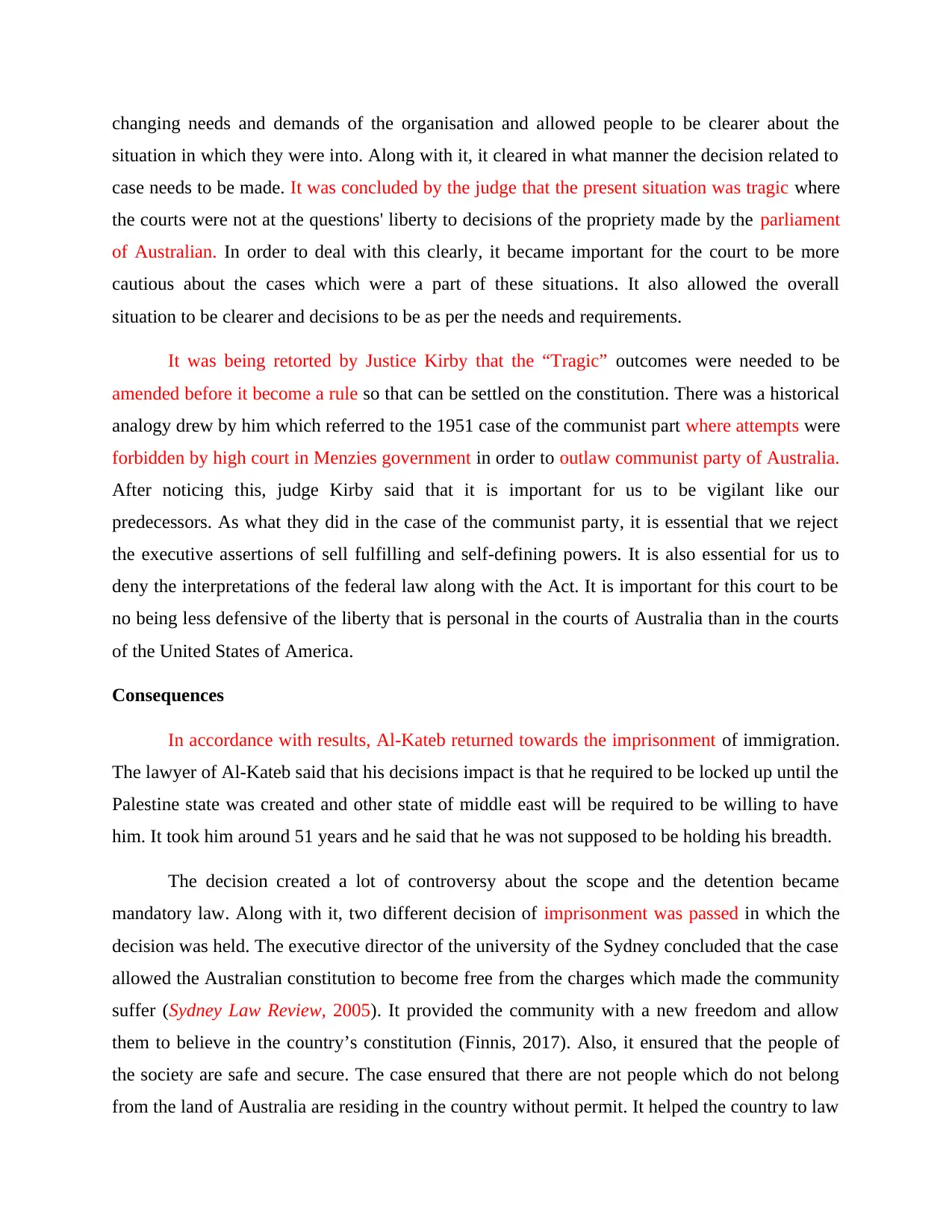
changing needs and demands of the organisation and allowed people to be clearer about the
situation in which they were into. Along with it, it cleared in what manner the decision related to
case needs to be made. It was concluded by the judge that the present situation was tragic where
the courts were not at the questions' liberty to decisions of the propriety made by the parliament
of Australian. In order to deal with this clearly, it became important for the court to be more
cautious about the cases which were a part of these situations. It also allowed the overall
situation to be clearer and decisions to be as per the needs and requirements.
It was being retorted by Justice Kirby that the “Tragic” outcomes were needed to be
amended before it become a rule so that can be settled on the constitution. There was a historical
analogy drew by him which referred to the 1951 case of the communist part where attempts were
forbidden by high court in Menzies government in order to outlaw communist party of Australia.
After noticing this, judge Kirby said that it is important for us to be vigilant like our
predecessors. As what they did in the case of the communist party, it is essential that we reject
the executive assertions of sell fulfilling and self-defining powers. It is also essential for us to
deny the interpretations of the federal law along with the Act. It is important for this court to be
no being less defensive of the liberty that is personal in the courts of Australia than in the courts
of the United States of America.
Consequences
In accordance with results, Al-Kateb returned towards the imprisonment of immigration.
The lawyer of Al-Kateb said that his decisions impact is that he required to be locked up until the
Palestine state was created and other state of middle east will be required to be willing to have
him. It took him around 51 years and he said that he was not supposed to be holding his breadth.
The decision created a lot of controversy about the scope and the detention became
mandatory law. Along with it, two different decision of imprisonment was passed in which the
decision was held. The executive director of the university of the Sydney concluded that the case
allowed the Australian constitution to become free from the charges which made the community
suffer (Sydney Law Review, 2005). It provided the community with a new freedom and allow
them to believe in the country’s constitution (Finnis, 2017). Also, it ensured that the people of
the society are safe and secure. The case ensured that there are not people which do not belong
from the land of Australia are residing in the country without permit. It helped the country to law
situation in which they were into. Along with it, it cleared in what manner the decision related to
case needs to be made. It was concluded by the judge that the present situation was tragic where
the courts were not at the questions' liberty to decisions of the propriety made by the parliament
of Australian. In order to deal with this clearly, it became important for the court to be more
cautious about the cases which were a part of these situations. It also allowed the overall
situation to be clearer and decisions to be as per the needs and requirements.
It was being retorted by Justice Kirby that the “Tragic” outcomes were needed to be
amended before it become a rule so that can be settled on the constitution. There was a historical
analogy drew by him which referred to the 1951 case of the communist part where attempts were
forbidden by high court in Menzies government in order to outlaw communist party of Australia.
After noticing this, judge Kirby said that it is important for us to be vigilant like our
predecessors. As what they did in the case of the communist party, it is essential that we reject
the executive assertions of sell fulfilling and self-defining powers. It is also essential for us to
deny the interpretations of the federal law along with the Act. It is important for this court to be
no being less defensive of the liberty that is personal in the courts of Australia than in the courts
of the United States of America.
Consequences
In accordance with results, Al-Kateb returned towards the imprisonment of immigration.
The lawyer of Al-Kateb said that his decisions impact is that he required to be locked up until the
Palestine state was created and other state of middle east will be required to be willing to have
him. It took him around 51 years and he said that he was not supposed to be holding his breadth.
The decision created a lot of controversy about the scope and the detention became
mandatory law. Along with it, two different decision of imprisonment was passed in which the
decision was held. The executive director of the university of the Sydney concluded that the case
allowed the Australian constitution to become free from the charges which made the community
suffer (Sydney Law Review, 2005). It provided the community with a new freedom and allow
them to believe in the country’s constitution (Finnis, 2017). Also, it ensured that the people of
the society are safe and secure. The case ensured that there are not people which do not belong
from the land of Australia are residing in the country without permit. It helped the country to law
⊘ This is a preview!⊘
Do you want full access?
Subscribe today to unlock all pages.

Trusted by 1+ million students worldwide
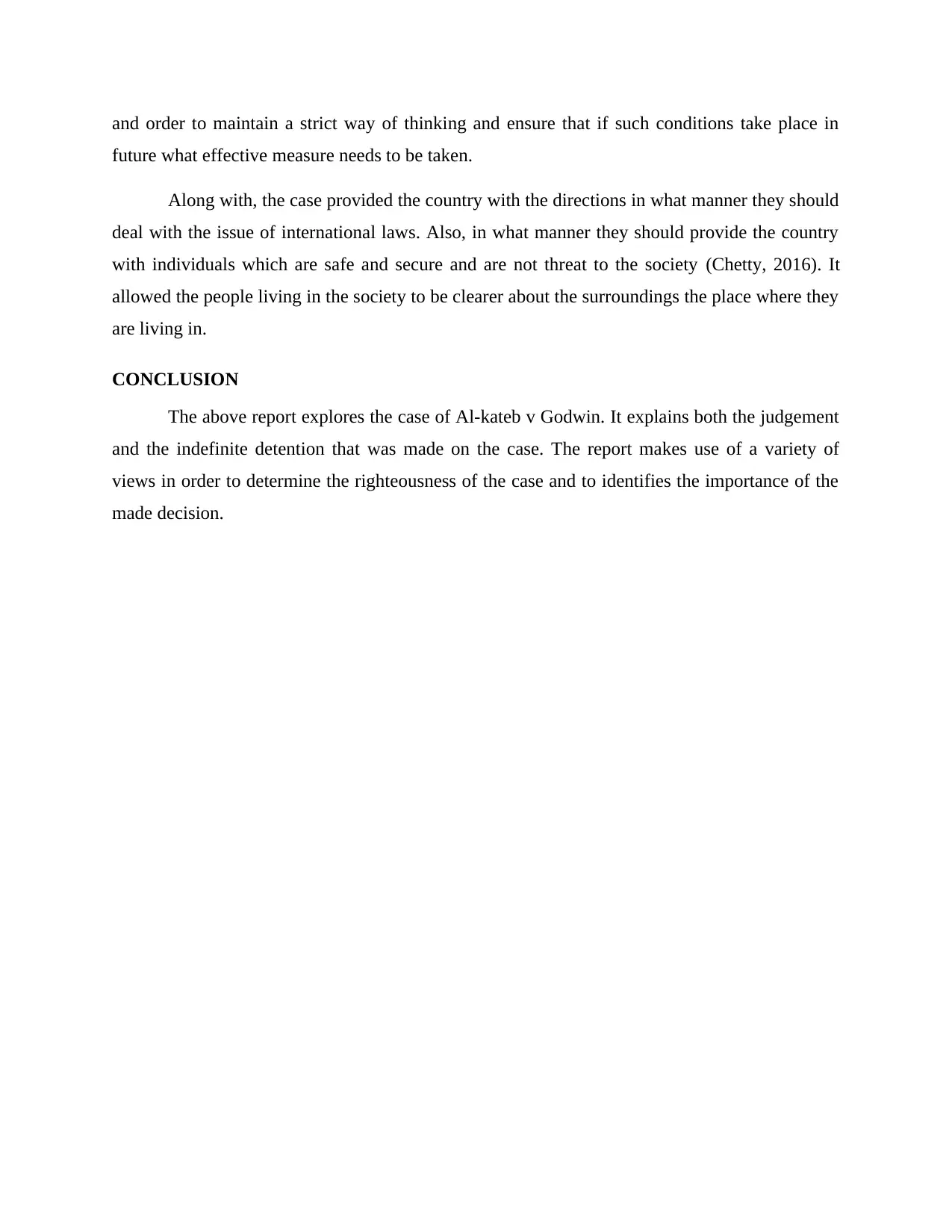
and order to maintain a strict way of thinking and ensure that if such conditions take place in
future what effective measure needs to be taken.
Along with, the case provided the country with the directions in what manner they should
deal with the issue of international laws. Also, in what manner they should provide the country
with individuals which are safe and secure and are not threat to the society (Chetty, 2016). It
allowed the people living in the society to be clearer about the surroundings the place where they
are living in.
CONCLUSION
The above report explores the case of Al-kateb v Godwin. It explains both the judgement
and the indefinite detention that was made on the case. The report makes use of a variety of
views in order to determine the righteousness of the case and to identifies the importance of the
made decision.
future what effective measure needs to be taken.
Along with, the case provided the country with the directions in what manner they should
deal with the issue of international laws. Also, in what manner they should provide the country
with individuals which are safe and secure and are not threat to the society (Chetty, 2016). It
allowed the people living in the society to be clearer about the surroundings the place where they
are living in.
CONCLUSION
The above report explores the case of Al-kateb v Godwin. It explains both the judgement
and the indefinite detention that was made on the case. The report makes use of a variety of
views in order to determine the righteousness of the case and to identifies the importance of the
made decision.
Paraphrase This Document
Need a fresh take? Get an instant paraphrase of this document with our AI Paraphraser
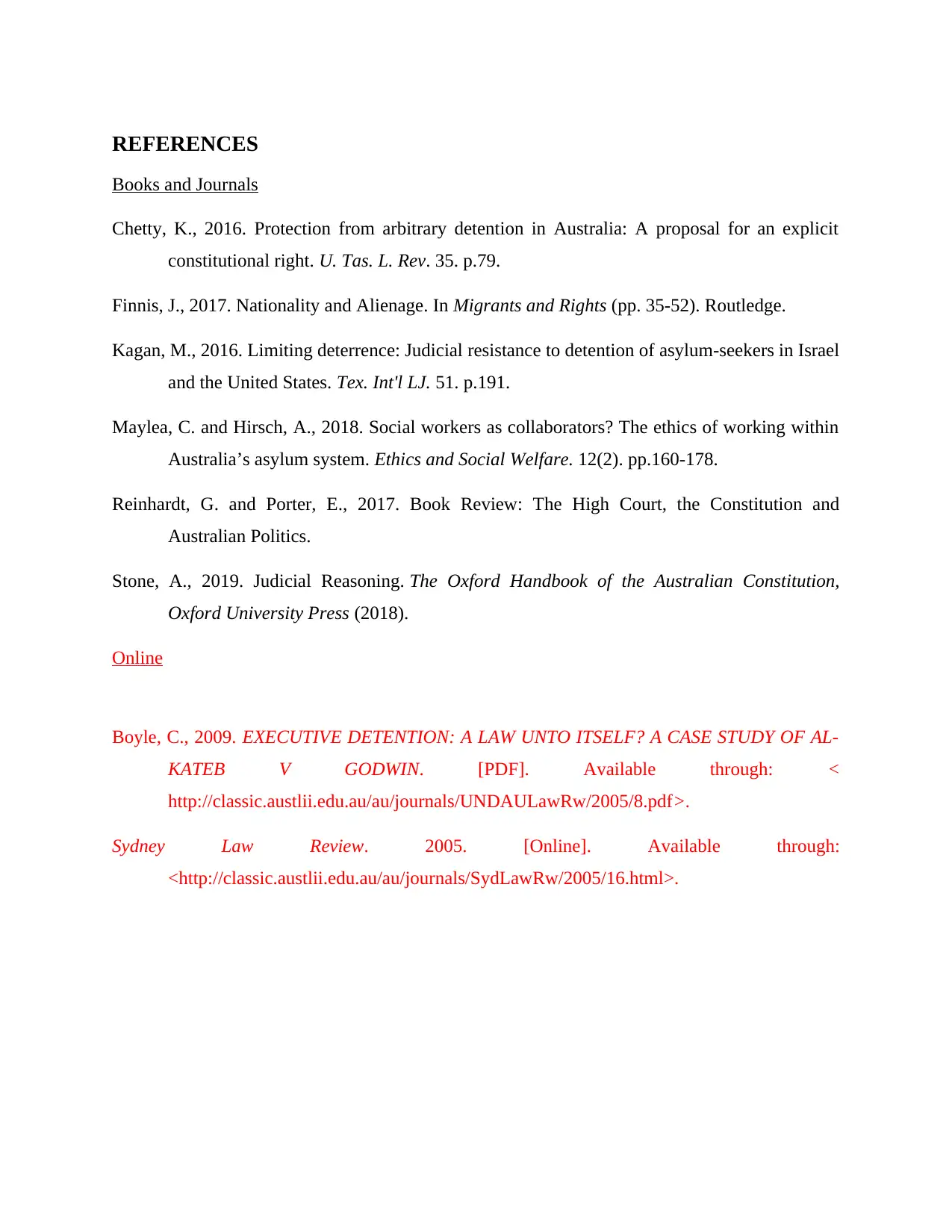
REFERENCES
Books and Journals
Chetty, K., 2016. Protection from arbitrary detention in Australia: A proposal for an explicit
constitutional right. U. Tas. L. Rev. 35. p.79.
Finnis, J., 2017. Nationality and Alienage. In Migrants and Rights (pp. 35-52). Routledge.
Kagan, M., 2016. Limiting deterrence: Judicial resistance to detention of asylum-seekers in Israel
and the United States. Tex. Int'l LJ. 51. p.191.
Maylea, C. and Hirsch, A., 2018. Social workers as collaborators? The ethics of working within
Australia’s asylum system. Ethics and Social Welfare. 12(2). pp.160-178.
Reinhardt, G. and Porter, E., 2017. Book Review: The High Court, the Constitution and
Australian Politics.
Stone, A., 2019. Judicial Reasoning. The Oxford Handbook of the Australian Constitution,
Oxford University Press (2018).
Online
Boyle, C., 2009. EXECUTIVE DETENTION: A LAW UNTO ITSELF? A CASE STUDY OF AL-
KATEB V GODWIN. [PDF]. Available through: <
http://classic.austlii.edu.au/au/journals/UNDAULawRw/2005/8.pdf>.
Sydney Law Review. 2005. [Online]. Available through:
<http://classic.austlii.edu.au/au/journals/SydLawRw/2005/16.html>.
Books and Journals
Chetty, K., 2016. Protection from arbitrary detention in Australia: A proposal for an explicit
constitutional right. U. Tas. L. Rev. 35. p.79.
Finnis, J., 2017. Nationality and Alienage. In Migrants and Rights (pp. 35-52). Routledge.
Kagan, M., 2016. Limiting deterrence: Judicial resistance to detention of asylum-seekers in Israel
and the United States. Tex. Int'l LJ. 51. p.191.
Maylea, C. and Hirsch, A., 2018. Social workers as collaborators? The ethics of working within
Australia’s asylum system. Ethics and Social Welfare. 12(2). pp.160-178.
Reinhardt, G. and Porter, E., 2017. Book Review: The High Court, the Constitution and
Australian Politics.
Stone, A., 2019. Judicial Reasoning. The Oxford Handbook of the Australian Constitution,
Oxford University Press (2018).
Online
Boyle, C., 2009. EXECUTIVE DETENTION: A LAW UNTO ITSELF? A CASE STUDY OF AL-
KATEB V GODWIN. [PDF]. Available through: <
http://classic.austlii.edu.au/au/journals/UNDAULawRw/2005/8.pdf>.
Sydney Law Review. 2005. [Online]. Available through:
<http://classic.austlii.edu.au/au/journals/SydLawRw/2005/16.html>.
1 out of 8
Related Documents
Your All-in-One AI-Powered Toolkit for Academic Success.
+13062052269
info@desklib.com
Available 24*7 on WhatsApp / Email
![[object Object]](/_next/static/media/star-bottom.7253800d.svg)
Unlock your academic potential
Copyright © 2020–2026 A2Z Services. All Rights Reserved. Developed and managed by ZUCOL.



